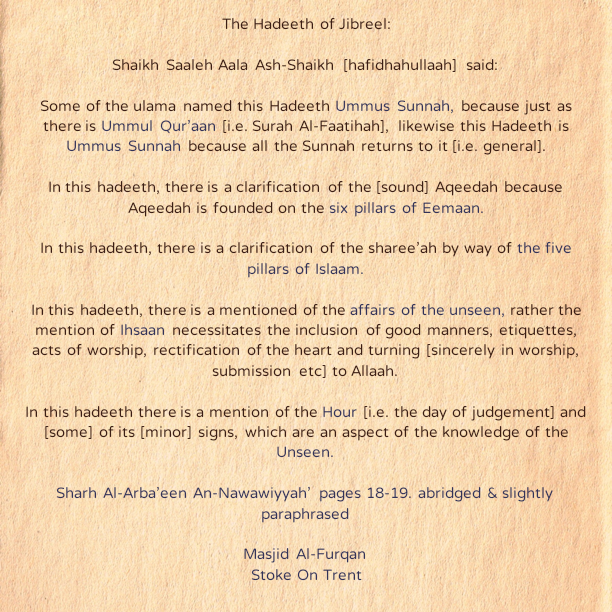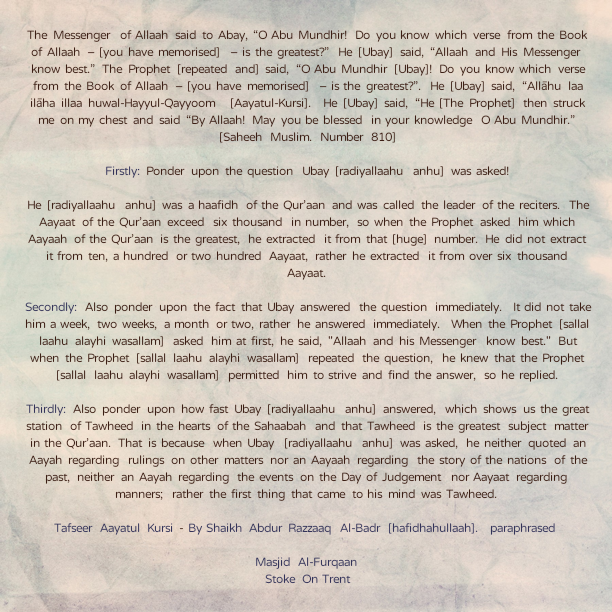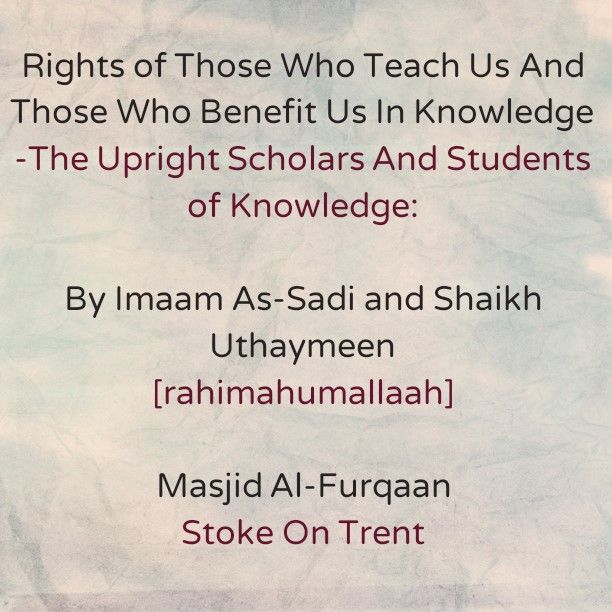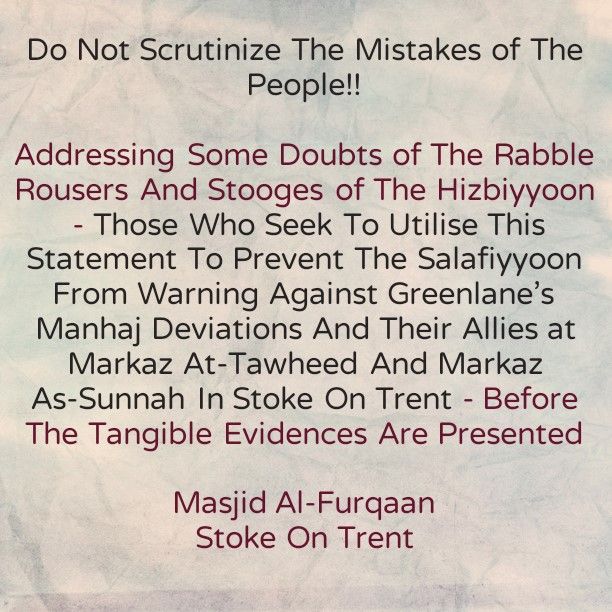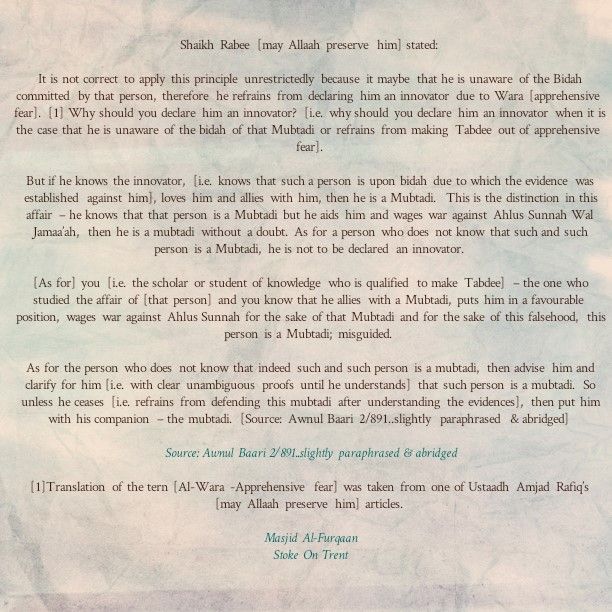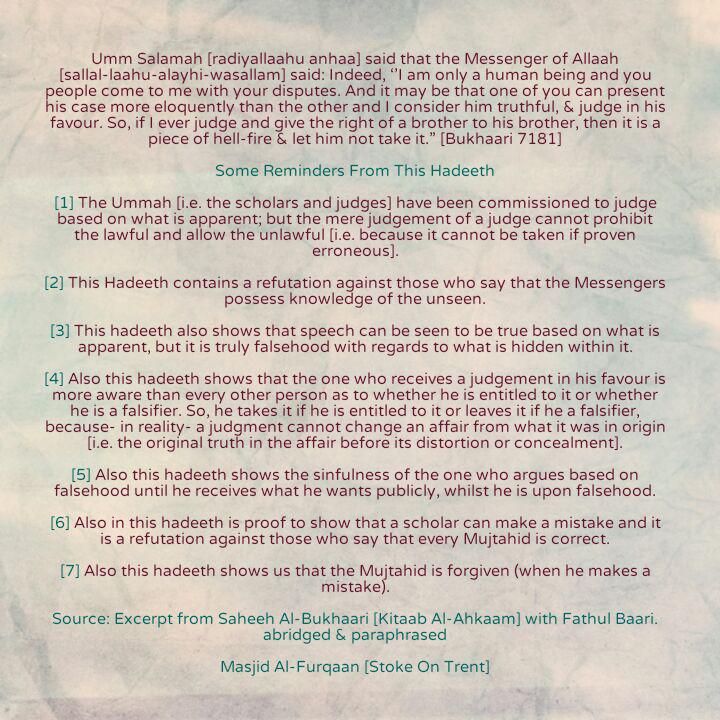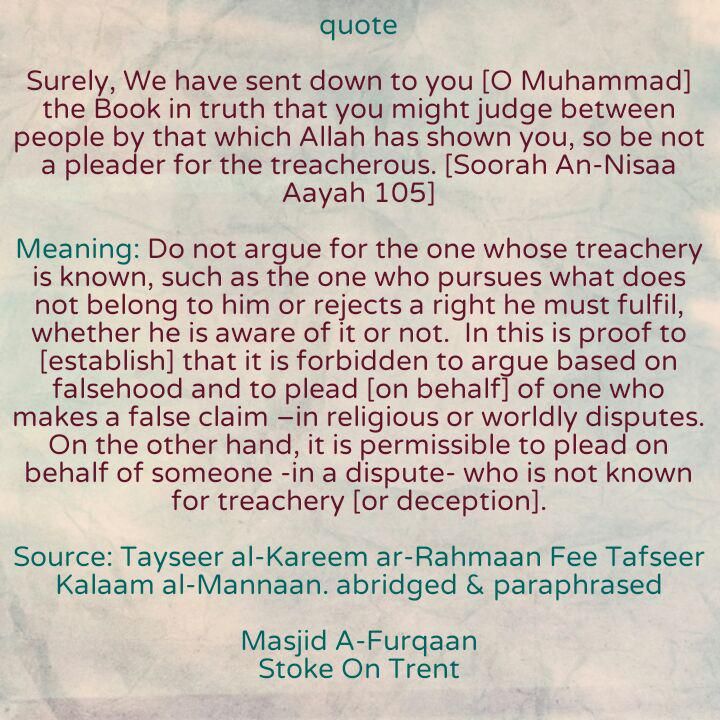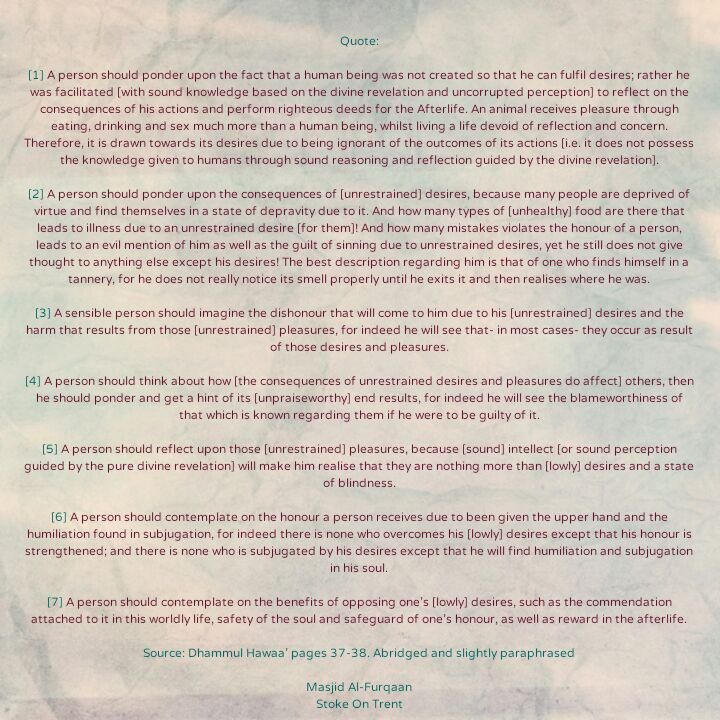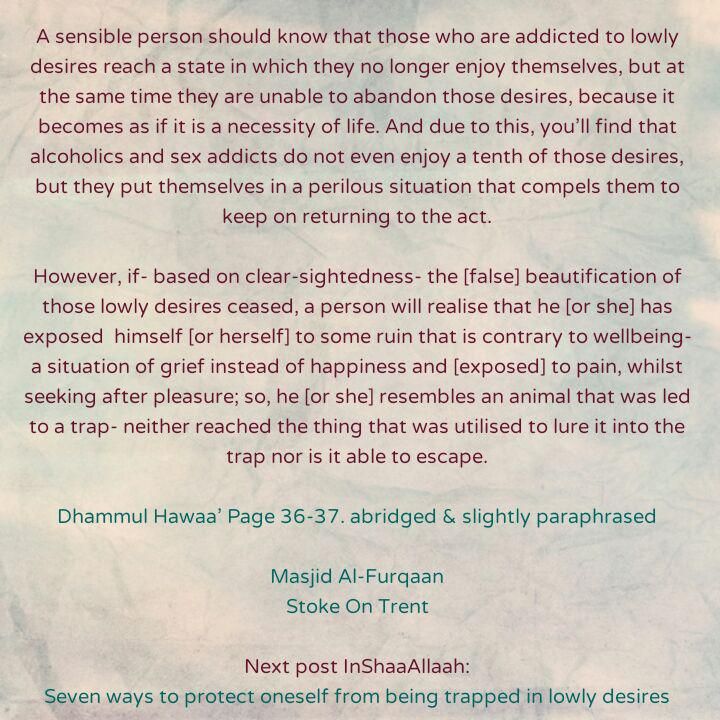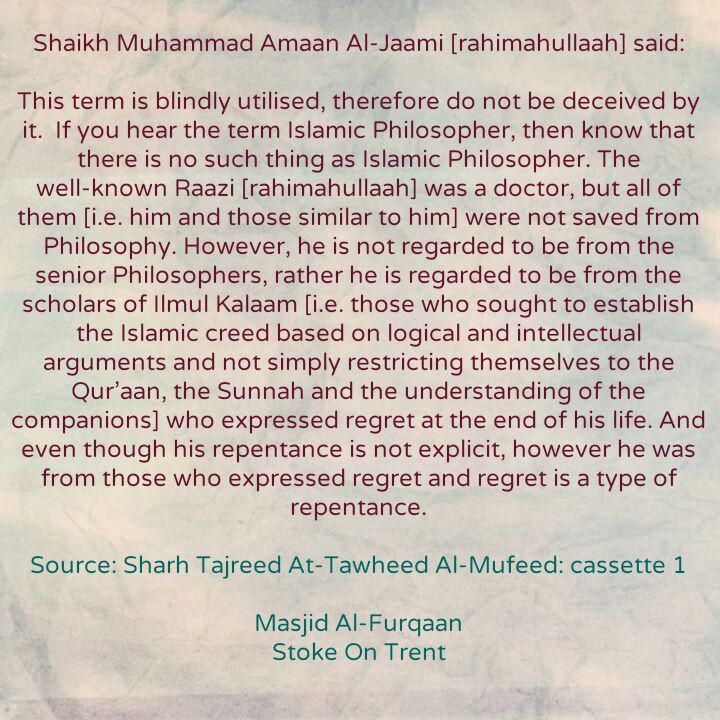Tag: scholars
When The Prophet Asked Ubay, ” Which Aayah In The Qur’aan Is The Greatest?” The Response He Gave Shows Us The Lofty Station of Tawheed In The Hearts of The Sahaabah – [By Shaikh Abdur Razzaaq Al-Badr (Hafidhahullaah)]
Written by Jallow Abdullah on . Posted in Belief - 'Aqeedah', Monotheism - Tawheed, Purification of The Soul, Qur'aan, Worship - 'Ibaadah'.
In The Name of Allaah, The Most Merciful, The Bestower of Mercy
The Messenger of Allah said to Abay, “O Abu Mundhir! Do you know which verse from the Book of Allah – [you have memorised] – is the greatest?” He [Ubay] said, “Allaah and His Messenger know best.” The Prophet [repeated and] said, “O Abu Mundhir [Ubay]! Do you know which verse from the Book of Allaah – [you have memorised] – is the greatest?”. He [Ubay] said, “Allāhu laa ilāha illa huwal-Hayyul-Qayyoom [Aayatul-Kursi]. He [Ubay] said, “He [The Prophet] then struck me on my chest and said “By Allah, may you be blessed in your knowledge O Aba Mundhir.” [Muslim, hadith no.810]
Firstly: Ponder upon the question Ubay [radiyallaahu anhu] was asked!
He [radiyallaahu anhu] was a haafidh of the Qur’aan and was called the leader of the reciters. The Aayaat of the Qur’aan exceed six thousand in number, so when the Prophet asked him which Aayaah of the Qur’aan is the greatest, he extracted it from that [huge] number. He did not extract it from ten, a hundred or two hundred Aayaat, rather he extracted it from over six thousand Aayaat.
Secondly: Ponder upon the fact also that Ubay answered the question immediately. It did not take him a week, two weeks, a month or two, rather he answered immediately. When the Prophet [sallal laahu alayhi wasallam] asked him at first, he said, “Allaah and his Messenger know best.” But when the Prophet [sallal laahu alayhi wasallam] repeated the question, he knew that the Prophet [sallal laahu alayhi wasallam] permitted him to strive and find the answer, so he replied.
Thirdly: Also ponder upon how fast Ubay [radiyallaahu anhu] answered, which shows us the great station of Tawheed in the hearts of the Sahaabah and that Tawheed is the greatest subject matter in the Qur’aan. That is because when Ubay [radiyallaahu anhu] was asked he did not quote an Aayah regarding rulings on other matters nor an Aayaah regarding the story of the nations of the past, nor an Aayah regarding the events on the Day of Judgement, nor Aayaat regarding manners, rather the first thing that came to his mind was Tawheed.
http://al-badr.net/sub/29
An Acknowledgement of The Respect Owed To The Upright Scholars And Students of Knowledge
Written by Jallow Abdullah on . Posted in Brotherhood, Calling To Islam - 'Da'wa', Methodology - 'Manhaj', Morals and Manners - 'Akhlaaq', Purification of The Soul, Scholars of Islam, Worship - 'Ibaadah'.
Therefore, the people must have love and respect for them. They must recognise their excellence and virtue, and thank them greatly. They are to supplicate for them in private and public, and seek nearness to Allaah by having love for them and praising them. They are to proclaim their excellence; guard the hearts [from harbouring evil against them] and [prevent] the tongues [from] insulting them, for this would tarnish their excellence. [End of quote] [Ref 1]
[1] The Prophet said: Pride is to reject the truth and mock at the people.
[2] This refers to shaytaan’s behaviour when he was commanded to prostrate to Aadam, but pride prevented him from doing so. He refused and was haughty.
[3] Raising oneself can either be by way of the tongue [i.e. speech] and it can also be by way of sentiments [feelings, attitude, behaviour etc]. He [i.e. the student] might be walking with his teacher, whilst swaggering and saying: I did this and I did this.
[4] Likewise, being arrogant towards the one who is below you in knowledge is pride. This also occurs from some of the students. If someone below him in knowledge informs him of something, you find him arrogant and does not accept.
[5] We ask Allaah for wellbeing because from the types of pride is to not act upon the knowledge one knows. [Ref 2]
Ref 2: Source: Sharh Hilyati Taalibil Ilm’ pages 38-40′ by Shaikh Uthaymeen [rahimahullaah]. abridged & slightly paraphrased
A Response To The Statement: Do Not Seek After The Mistakes of The People- [By Shaikh Muhammad Baazmool]
Written by Jallow Abdullah on . Posted in Methodology - 'Manhaj', Refutations, Scholars of Islam.
In The Name of Allaah, The Most Merciful, The Bestower of Mercy
Shaikh Muhammad Baazmool [may Allaah preserve him] said:
This statement is reiterated by some people when warning reaches them from one of the scholars or a student of knowledge against innovated statements [or views] that have occurred from some of the people, or when informed about mistakes committed in knowledge; so you find that his face becomes red, his [behaviour] changes and he says, ‘’Do not scrutinise the beliefs of the people and do not seek after mistakes.’’ The reality is that this statement is truth by way of which falsehood is intended in this particular instance.
Firstly: The right place to [make this statement] is when one seeks after secrets and hidden affairs that have neither manifested nor are there any factual evidence to substantiate that. The place [where this statement cannot be uttered] is when innovation appears from one of [the people] or when one of them calls to falsehood, since there is a difference between that which is manifested and that which is either concealed and unknown or there is no indication to [affirm the affair].
Secondly: This statement of theirs will lead to the abandonment of warning against mistakes, innovation and falsehood, and the common people will be beguiled; rather even some of the students of knowledge will become heedless of this situation.
Thirdly: Was the speech of the Salaf in relation to warning against innovation and the people of falsehood not [carried out] from the angle of warning against false beliefs, innovations and affairs that are in opposition to the Sunnah? So, how can it be said, ‘do not scrutinise the beliefs and mistakes of the people’ to a person who either warns against an innovation that has been manifested or points out a mistake committed by an individual?
Fourthly: Scrutinising the beliefs of the people by way of interrogation and trial as the Khaleefah Mamoon did with regards to the belief that the [Qur’aan is created], then this is an innovation that is warned against. [However] to make a clarification and [issue] warning against an innovation that is propagated by some people, unveiling the falsehood of the callers to falsehood and warning against them, this is not from that [type of scrutiny that is disapproved].
Fifthly: Those who blame the one who unveils the [affairs] of the people of falsehood and issues warning against them, then it is either that they reject innovations or do not reject them! If they reject innovation, point out mistakes and falsehood, and warn against them, then indeed they have pursued the right course by the Will of Allaah [The Most High]’ but why would they disapprove of those who take their place in renouncing innovation?! And if they do not warn the people against falsehood, then this [i.e. behaviour or stance of theirs] is not from the methodology of the Salaf and it suffices as a rebuke against them.
Sixthly: It has been reported in Durar As-Saniyyah [1/33] that the Imaam, the Mujaddid, Muhammad Bin Abdul Wahhaab [rahimahullaah] said: I hold that the people of innovation are to be boycotted and their affair is to be made known until they repent. I pass judgement against them based on what is apparent and I leave their secrets [or hidden] affairs to Allaah. And I believe that every newly invented matter in the Religion is an innovation.
This [statement of Imaam Muhammad Bin Abdul Wahhaab [rahimahullaah] is the statement of a Salafiy Athariy [i.e. a true follower of the Salaf and the authentic narrations] that emanates from the statement of Umar Ibnul Khattaab [radiyallaahu-anhu] when he said:
”People were (sometimes) judged by the revealing of a Divine Inspiration during the lifetime of Allah’s Apostle but now there is no longer any more (new revelation). Now we judge you by the deeds you practice publicly, so we will trust and favour the one who does good deeds in front of us, and we will not call him to account about what he is really doing in secret, for Allah will judge him for that; but we will not trust or believe the one who presents to us with an evil deed even if he claims that his intentions were good.’’ [Saheeh Bukhaari; Vol 3; Hadith Number:2641]
So examine the statement of Imaam Muhammad Bin Abdul Wahhaab [rahimahullaah] when he said: ”I judge [ahlul bidah] based upon what is apparent” and examine the statement of Umar Ibnul Khattaab [radiyallaahu-anhu] when he said, ”But we will not trust or believe the one who presents to us with an evil deed even if he claims that his intentions were good.” Then examine the [affair] of that person who disapproves of one who warns against ahlul bidah and exposes their falsehood- claiming that ]this warning against ahlul bidah] is tantamount to [blameworthy] scrutiny of the Aqeedah of the people. Is this [statement of his] correct? Glorified and Exalted You are, O My Lord! Is not judgement passed against the people except through what is apparent?! This principle affirmed by Al Faarooq, Umar Ibnul Khattaab [radiyallaah-anhu] is utiliseed in in warning against a person of innovation when he manifests his innovation.
The Stance of Imaam Ahmad towards Daawood Ibn Ali Al- Asbahaanee
Daawood Ibn Ali Al-Asbahaanee came to Saaleh Ibn Imaam Ahmad Ibn Hanbal with whom he used to have a good relationship. So he [Daawood] spoke to Saaleh Ibn Imaam Ahmad to make it easy for him to meet his father. So Saaleh approached Imaam Ahmad [i.e. his father] and said: A man asked me to bring him to you.
Imaam Ahmad said: What is his name?
Saaleh replied: Daawood.
Imaam Ahmad said: Where is he from?
Saaleh replied: He is from the people of Asbahaan.
Imaam Ahmad said: Has he being [involved] in fabricating anything?
At this point: Saaleh refrained from describing Daawood to his father [Imaam Ahmad]. So he [Imaam Ahmad] did not stop enquiring about Daawood until he knew who he was. Then he said: Muhammad Bin Yahyaa An-Naysabooree wrote to me about this [Daawood] saying that he [Daawood] claims that the Qur’aan is something that was brought into existence [i.e. created], so do not bring him near me.
Saaleh said: O my father! he [Daawood] has negated and renounced this [statement].
Imaam Ahmad replied: Muhammad Bin Yahyaa is more trustworthy than him. I do not give you permission to bring him to me.
O my brother! Contemplate upon the stance of Imaam Ahmad. He is the Imaam of Ahlus Sunnah Wal Jamaa’ah in his adherence to the Sunnah of the Prophet [sallal-laahu-alayhi-wasallam] and the narrations of the Sahaabah; so did he use to scrutinise the beliefs of the people and seek after their mistakes?! So examine his [above conversation with his son Saaleh] as well as the statement of Umar Ibnul Khattaab mentioned earlier, ”But we will not trust or believe the one who presents to us with an evil deed even if he claims that his intentions were good.”
Therefore, the statement of Muhammad Ibn Abdul Wahhaab [rahimahullaah] is certified by the statements of the Rightly Guided Khaleefah Umar Ibnul Khattaab [radiyallaahu-anhu] and that of Imaam Ahmad Bin Hanbal [rahimahullaah].
[1] Source: ‘Ibaaraat Moohimah’ pages 66-69. slightly paraphrased]
[Whoever Does Not Make Tabdee of a Mubtadi is a Mubtadi Himself]! – Unveiling The Fraudulent Claims of The Rabble Rousers and Stooges of The Hizbiyyoon Who Claim That The Salafiyyoon Apply This Statement Unrestrictedly
Written by Jallow Abdullah on . Posted in Announcements, Calling To Islam - 'Da'wa', Methodology - 'Manhaj', Scholars of Islam, Worship - 'Ibaadah'.
Inn The Name of Allaah, The Most Merciful, The Bestower of Mercy
Whoever does not make Tabdee of a Mubtadi is himself a Mubtadi!
Shaikh Rabee [may Allaah preserve him] stated:
It is not correct to apply this principle unrestrictedly because it maybe that he is unaware of the Bidah committed by that person, therefore he refrains from declaring him an innovator due to Wara [apprehensive fear]. [1] Why should you declare him an innovator? [i.e. why should you declare him an innovator when it is the case that he is unaware of the bidah of that Mubtadi or refrains from making Tabdee out of apprehensive fear].
But if he knows the innovator, [i.e. knows that such a person is upon bidah due to which the evidence was established against him], loves him and allies with him, then he is a Mubtadi. This is the distinction in this affair – he knows that that person is a Mubtadi but he aids him and wages war against Ahlus Sunnah Wal Jamaa’ah, then he is a mubtadi without a doubt. As for a person who does not know that such and such person is a Mubtadi, he is not to be declared an innovator.
[As for] you [i.e. the scholar or student of knowledge who is qualified to make Tabdee] – the one who studied the affair of [that person] and you know that he allies with a Mubtadi, puts him in a favourable position, wages war against Ahlus Sunnah for the sake of that Mubtadi and for the sake of this falsehood, this person is a Mubtadi; misguided.
As for the person who does not know that indeed such and such person is a mubtadi, then advise him and clarify for him [i.e. with clear unambiguous proofs until he understands] that such person is a mubtadi. So unless he ceases [i.e. refrains from defending this mubtadi after understanding the evidences], then put him with his companion – the mubtadi. [Source: Awnul Baari 2/891..slightly paraphrased & abridged]
[1]Translation of the tern [Al-Wara -Apprehensive fear] was taken from one of Ustaadh Amjad Rafiq’s [may Allaah preserve him] articles.
Advice to Disputing Parties -[The Grave Danger of Arguing Eloquently Until You Take What Does Not Belong To You]
Written by Jallow Abdullah on . Posted in Brotherhood, Calling To Islam - 'Da'wa', Morals and Manners - 'Akhlaaq', Purification of The Soul, Scholars of Islam, Worship - 'Ibaadah'.
In The Name of Allaah, The Most Merciful, The Bestower of Mercy
Umm Salamah [radiyallaahu anhaa] said that the Messenger of Allaah [sallal-laahu-alayhi-wasallam] said: Indeed, ‘’I am only a human being and you people come to me with your disputes. And it may be that one of you can present his case more eloquently than the other and I consider him truthful, & judge in his favour. So, if I ever judge and give the right of a brother to his brother, then it is a piece of hell-fire & let him not take it.” [Bukhaari 7181]
Some Reminders From This Hadeeth
[1] The Ummah [i.e. the scholars and judges] have been commissioned to judge based on what is apparent; but the mere judgement of a judge cannot prohibit the lawful and allow the unlawful [i.e. because it cannot be taken if proven erroneous].
[2] This Hadeeth contains a refutation against those who say that the Messengers possess knowledge of the unseen.
[3] This hadeeth also shows that speech can be seen to be true based on what is apparent, but it is truly falsehood with regards to what is hidden within it.
[4] Also this hadeeth shows that the one who receives a judgement in his favour is more aware than every other person as to whether he is entitled to it or whether he is a falsifier. So, he takes it if he is entitled to it or leaves it if he a falsifier, because- in reality- a judgment cannot change an affair from what it was in origin [i.e. the original truth in the affair before its distortion or concealment].
[5] Also this hadeeth shows the sinfulness of the one who argues based on falsehood until he receives what he wants publicly, whilst he is upon falsehood.
[6] Also in this hadeeth is proof to show that a scholar can make a mistake and it is a refutation against those who say that every Mujtahid is correct.
[7] Also this hadeeth shows us that the Mujtahid is forgiven (when he makes a mistake).
Source: Excerpt from Saheeh Al-Bukhaari [ Kitaab Al-Ahkaam] with Fathul Baari. abridged & paraphrased
Our Lord Forbade Us from Pleading On Behalf of Those Known for Treachery In Religious Or Worldly Affairs
Written by Jallow Abdullah on . Posted in Morals and Manners - 'Akhlaaq', Purification of The Soul, Qur'aan, Scholars of Islam, Worship - 'Ibaadah'.
In The Name of Allaah, The Most Merciful, The Bestower of Mercy
Allaah [The Most High] said:
إِنَّآ أَنزَلۡنَآ إِلَيۡكَ ٱلۡكِتَـٰبَ بِٱلۡحَقِّ لِتَحۡكُمَ بَيۡنَ ٱلنَّاسِ بِمَآ أَرَٮٰكَ ٱللَّهُۚ وَلَا تَكُن لِّلۡخَآٮِٕنِينَ خَصِيمً۬ا
Surely, We have sent down to you [O Muhammad] the Book in truth that you might judge between people by that which Allah has shown you, so be not a pleader for the treacherous. [Soorah An-Nisaa Aayah 105]
Meaning: Do not argue for the one whose treachery is known, such as the one who pursues what does not belong to him or rejects a right he must fulfil, whether he is aware of it or not. In this is proof to [establish] that it is forbidden to argue based on falsehood and to plead [on behalf] of one who makes a false claim –in religious or worldly disputes. On the other hand, it is permissible to plead on behalf of someone -in a dispute- who is not known for treachery [or deception].
[Source: Tayseer al-Kareem ar-Rahmaan Fee Tafseer Kalaam al-Mannaan. abridged & paraphrased]
[4] Excerpts from The Dispraise of [Unrestrained] Desires – By Imaam Ibnul Jawzi [Seven Contemplations Regarding Its Evil Outcomes]
Written by Jallow Abdullah on . Posted in Morals and Manners - 'Akhlaaq', Purification of The Soul, Scholars of Islam, Worship - 'Ibaadah'.
In The Name of Allaah, The Most Merciful, The Bestower of Mercy
[1] A person should ponder upon the fact that a human being was not created so that he can fulfil desires; rather he was facilitated [with sound knowledge based on the divine revelation and uncorrupted perception] to reflect on the consequences of his actions and perform righteous deeds for the Afterlife. An animal receives pleasure through eating, drinking and sex much more than a human being, whilst living a life devoid of reflection and concern. Therefore, it is drawn towards its desires due to being ignorant of the outcomes of its actions [i.e. it does not possess the knowledge given to humans through sound reasoning and reflection guided by the divine revelation].
[2] A person should ponder upon the consequences of [unrestrained] desires, because many people are deprived of virtue and find themselves in a state of depravity due to it. And how many types of [unhealthy] food are there that leads to illness due to an unrestrained desire [for them]! And how many mistakes violates the honour of a person, leads to an evil mention of him as well as the guilt of sinning due to unrestrained desires, yet he still does not give thought to anything else except his desires! The best description regarding him is that of one who finds himself in a tannery, for he does not really notice its smell properly until he exits it and then realises where he was.
[3] A sensible person should imagine the dishonour that will come to him due to his [unrestrained] desires and the harm that results from those [unrestrained] pleasures, for indeed he will see that- in most cases- they occur as result of those desires and pleasures.
[4] A person should think about how [the consequences of unrestrained desires and pleasures do affect] others, then he should ponder and get a hint of its [unpraiseworthy] end results, for indeed he will see the blameworthiness of that which is known regarding them if he were to be guilty of it.
[5] A person should reflect upon those [unrestrained] pleasures, because [sound] intellect [or sound perception guided by the pure divine revelation] will make him realise that they are nothing more than [lowly] desires and a state of blindness.
[6] A person should contemplate on the honour a person receives due to been given the upper hand and the humiliation found in subjugation, for indeed there is none who overcomes his [lowly] desires except that his honour is strengthened; and there is none who is subjugated by his desires except that he will find humiliation and subjugation in his soul.
[7] A person should contemplate on the benefits of opposing one’s [lowly] desires, such as the commendation attached to it in this worldly life, safety of the soul and safeguard of one’s honour, as well as reward in the afterlife.
Source: Dhammul Hawaa’ pages 37-38. Abridged and slightly paraphrased
[3] Excerpts from The Dispraise of [Unrestrained Desires]- By Imaam Ibnul Jawzi [rahimahullaah]
Written by Jallow Abdullah on . Posted in Morals and Manners - 'Akhlaaq', Purification of The Soul, Scholars of Islam.
In The Name of Allaah, The Most Merciful, The Bestower of Mercy
Imaam Ibnul Jawzi [rahimahullaah] said:
A sensible person should know that those who are addicted to lowly desires reach a state in which they no longer enjoy themselves, but at the same time they are unable to abandon those desires, because it becomes as if it is a necessity of life. And due to this, you’ll find that alcoholics and sex addicts do not even enjoy a tenth of those desires, but they put themselves in a perilous situation that compels them to keep on returning to the act. However, if- based on clear-sightedness- the [false] beautification of those lowly desires ceased, a person will realise that he [or she] has exposed himself [or herself] to some ruin that is contrary to wellbeing- a situation of grief instead of happiness and [exposed] to pain, whilst seeking after pleasure; so, he [or she] resembles an animal that was led to a trap- neither reached the thing that was utilised to lure it into the trap nor is it able to escape.
Next post InShaaAllaah: Seven ways to protect oneself from being trapped in lowly desires
Dhammul Hawaa’ Page 36-37. abridged & slightly paraphrased
The Term ‘Islamic Philosopher’ – Myth or Fact?
Written by Jallow Abdullah on . Posted in Calling To Islam - 'Da'wa', Deviated Groups, Sects and Parties, Purification of The Soul, Scholars of Islam.
In The Name of Allaah, The Most Merciful, The Bestower of Mercy
Shaikh Muhammad Amaan al-Jaami [rahimahullaah] said:
This term is blindly utilised, therefore do not be deceived by it. If you hear the term Islamic Philosopher, then know that there is no such thing as Islamic Philosopher. The well-known Raazi [rahimahullaah] was a doctor, but all of them [i.e. him and those like him] were not saved from Philosophy. However, he is not regarded to be from the senior Philosophers, rather he is regarded to be from the scholars of Ilmul Kalaam [i.e. those who sought to establish the Islamic creed based on logical and intellectual arguments and not simply restricting themselves to the Qur’aan, the Sunnah and the understanding of the companions] who expressed regret at the end of his life. And even though his repentance is not explicit, however he was from those who expressed regret and regret is a type of repentance.
Source: Sharh Tajreed At-Tawheed Al-Mufeed: cassette 1
